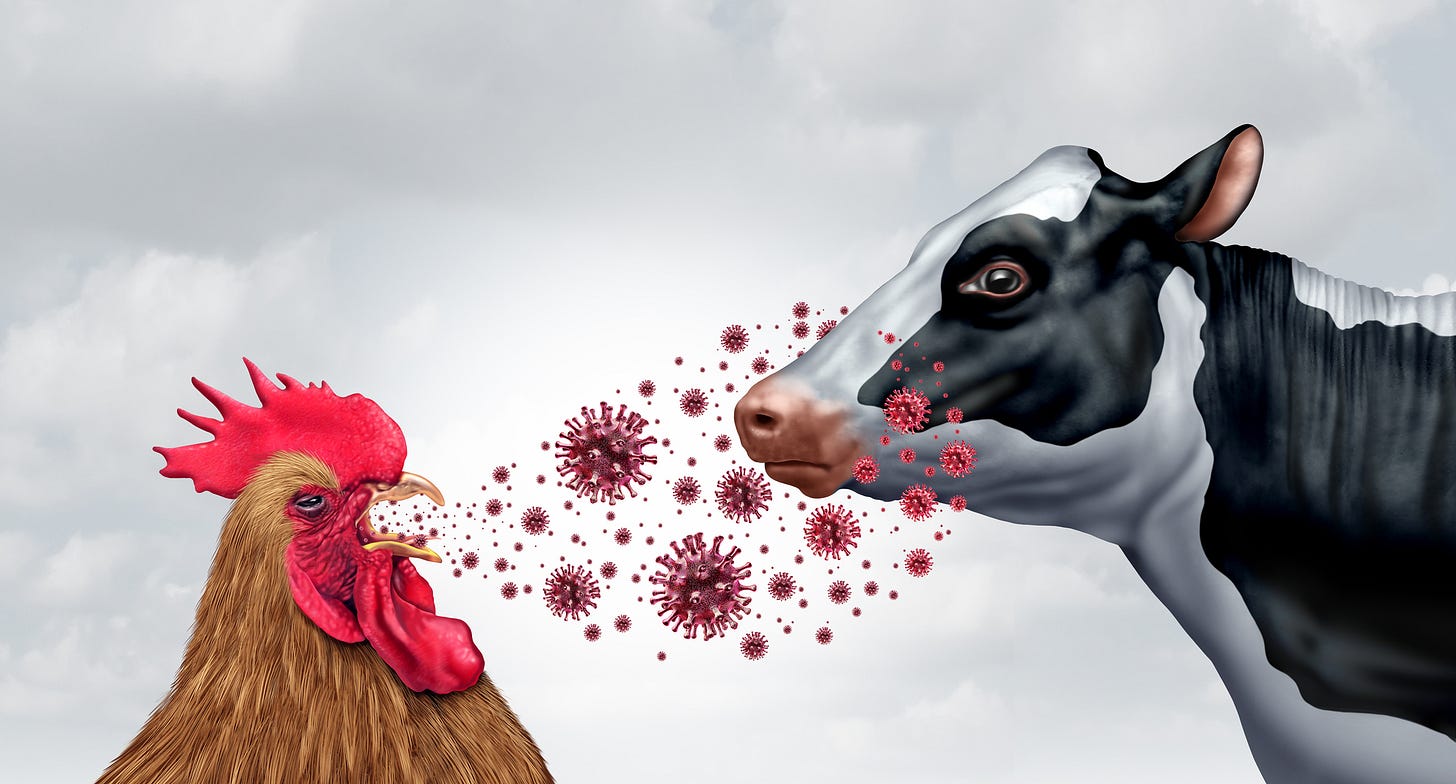Public health officials are urging Americans to be prepared for a potential bird flu pandemic. Former CDC Director, Robert Redfield, recently called a bird flu outbreak "very likely." Avian influenza, commonly known as bird flu, primarily affects birds. However, some strains, like the current H5N1, can jump species and cause serious illness in humans.
‘‘A potential bird flu pandemic looms as H5N1 infects US dairy cows, marking the first human-animal transmission with a single confirmed case in a dairy worker. Public health officials urge preparedness, echoing former CDC Director Redfield's warning of a "very likely" outbreak.’’
The situation has become more concerning due to a recent development. Since March 2024, outbreaks of H5N1 have been reported in American dairy cow herds. This adds another layer of complexity, as the virus can now potentially spread through close contact with infected animals. While the CDC maintains a low public health risk assessment for now, there has been one confirmed human case in a dairy worker, highlighting the possibility of zoonotic transmission.
Experts are urging preparedness due to the virus's ability to mutate. Increased vigilance and public health measures are crucial to prevent a full-blown pandemic.
The Urgency for Action
Redfield warns that a bird flu pandemic could have a devastating impact, with mortality rates as high as 50% for certain strains. This highlights the need for immediate action to prepare and prevent such an outbreak. One potential preventative measure gaining traction is the adoption of a pro-vegan plant-based diet.
Understanding Bird Flu
Bird flu is caused by various influenza A virus strains that circulate among wild birds. Some strains, like H5N1, can be transmitted to humans through close contact with infected birds or contaminated environments. While current human infection rates are low, the virus's ability to mutate and adapt raises concerns about future pandemics.
How Does Bird Flu Compare to Covid-19?
While Covid-19 spread rapidly and caused significant illness, some bird flu strains could be even more deadly. Additionally, Covid-19 placed immense strain on global health systems. A highly contagious and severe bird flu pandemic could have even more catastrophic consequences. Past outbreaks of bird flu, such as the H5N1 outbreaks in the early 2000s, serve as a cautionary tale.
The Link Between Animal Agriculture and Pandemics
Intensive farming practices, where large numbers of animals are confined in close quarters, create ideal conditions for viruses to spread and mutate. This close proximity between different species facilitates the jump of viruses from animals to humans, known as zoonotic transmission.
Examples of Animal Agriculture and Zoonotic Diseases
H1N1 (Swine Flu) and SARS-CoV-2 (Covid-19) are both examples of viruses originating in animals and causing major human pandemics. This suggests a strong link between intensive animal agriculture and the emergence of zoonotic diseases.
Benefits of the Vegan Plant-Based Diet
Shifting towards a pro-vegan plant-based diet offers a potential solution to reduce the risk of future pandemics. By reducing reliance on animal agriculture, we can eliminate a major source of zoonotic disease transmission. Additionally, plant-based diets promote healthier ecosystems, potentially reducing the emergence of viruses in animal populations.
Plant-Based Diets: More Than Just Pandemic Prevention
Beyond pandemic prevention, plant-based diets offer numerous health benefits. Research suggests they can improve human health, boost immunity, and lower the risk of chronic diseases.
Environmental Impact
Animal agriculture is a major contributor to environmental degradation. Deforestation, habitat loss, biodiversity decline, and greenhouse gas emissions are all closely linked to animal farming. Shifting towards plant-based diets reduces our environmental footprint and promotes sustainable food production practices.
Ethical Considerations
Factory farming raises serious ethical concerns regarding animal welfare and cruelty. Choosing a plant-based diet aligns with the values of compassion and respect for all living beings. Public health ethics also play a role, as dietary changes can collectively benefit public health and prevent pandemics.
Taking Action: Transitioning to Plant-Based Eating
Individuals can make a difference by gradually incorporating more plant-based meals into their diets. Numerous resources and recipes are readily available to help with this transition. Additionally, policymakers and institutions can play a crucial role by promoting plant-based diets through policies and supporting sustainable agriculture initiatives.
Conclusion
The potential threat of a bird flu pandemic underscores the need for immediate action. A plant-based diet offers a multi-pronged solution, promoting public health, environmental sustainability, and ethical treatment of animals. By embracing this dietary shift, we can build a healthier and more resilient future for ourselves and the planet.
Sources:
CDC Bird Flu(https://www.cdc.gov/bird-flu/index.html)
AAMC How Worried About Avian Flu? Academic Experts Weigh In(https://www.goodrx.com/health-topic/infections/bird-flu-outbreak)
Centers for Disease Control and Prevention (CDC): https://www.cdc.gov/bird-flu/index.html
U.S. Food and Drug Administration (FDA): https://www.fda.gov/food/alerts-advisories-safety-information/updates-highly-pathogenic-avian-influenza-hpai
Visit Our Amazon Store!
Notice: As an Amazon Associate, we earn a commission from qualifying purchases that help promote animal rights worldwide!
General Resources
Books:
Dominion: The Power of Animals in Nature and in Our Imagination by Matthew Scully
Animal Liberation by Peter Singer
Eating Animals by Jonathan Safran Foer
A Billion Hungry Mouths: Feeding the World Without Consuming the Planet by Colin Tudge
Websites and organizations:
Documentaries:
Articles:
"The Case for Animal Rights" by Tom Regan
‘‘Why We Love Dogs, Eat Pigs, and Wear Cows: An Introduction to Carnism’’ by Melanie Joy
‘‘Animal Rights: The Abolitionist Approach’’ by Gary L. Francione
‘‘Fellow Creatures: Our Obligations to the Other Animals’’ by Christine Korsgaard
Seeds of Compassion: Finding Jesus Christ in a Vegan World by Michael Corthell
Receive a single informative article daily at 12:01 AM by email. Explore my homepage with exciting vegan and plant-based news content and delightful and delicious recipes for additional updates. Stay connected to the vegan world and all it has to offer.
Visit The Vegan Project Global our Facebook page for more vegan outreach and education.
Also, visit our new YouTube channel
The information on this vegan/plant-based blog is for general informational purposes only. It is not intended as legal, medical, or professional advice. Readers should consult with appropriate professionals for specific advice tailored to their situation. The blog owner is not responsible for any reliance on the information herein.





